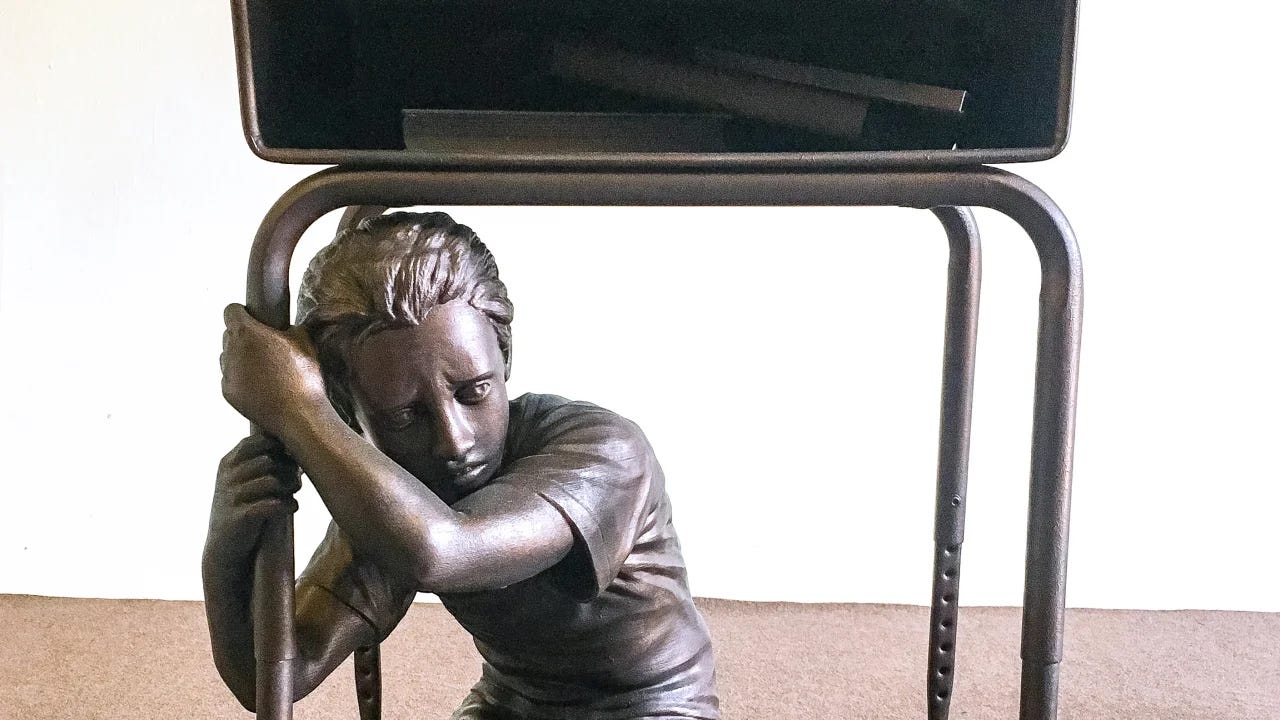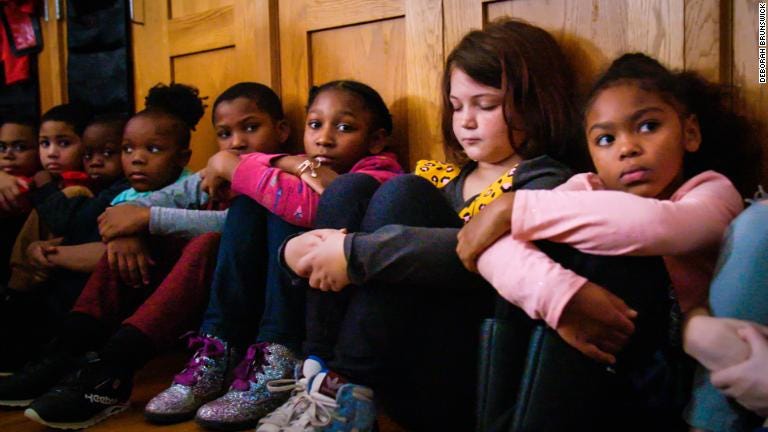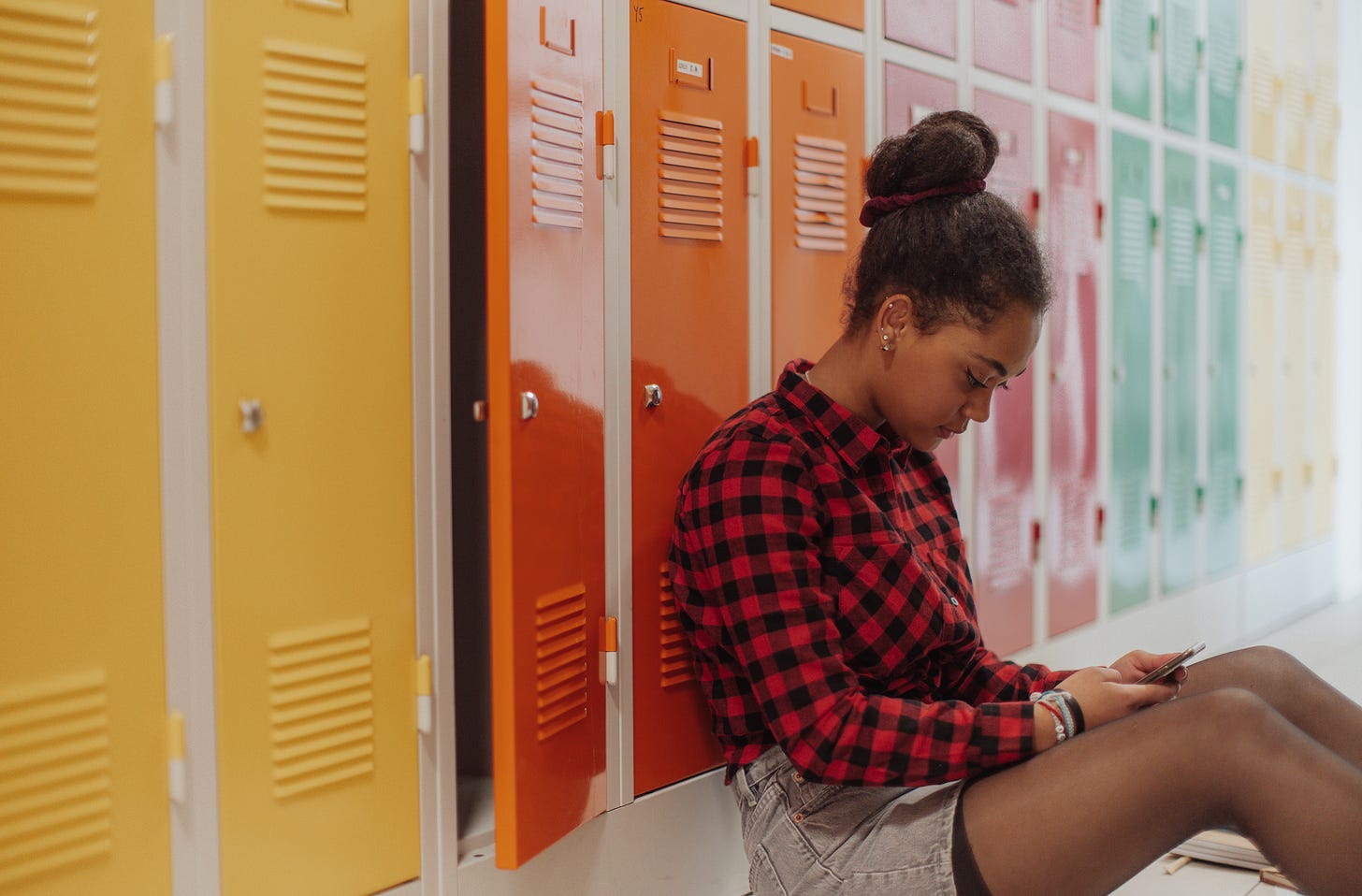Mourning Becomes Her
Living Crouched Under A School Desk.
Image: A bronze-coated statue based on the Parkland shooting: CNN.com
One of the premises of Beyond Belief is that the materialist worldview (the idea that physical matter is all that exists) is not only incorrect but has a profoundly negative influence on the human mind. There are many reasons that our younger generations have significantly higher rates of anxiety and depression but one of them surely is the nihilism that follows physicalism as day follows night.
Erin is a brilliant Gen Z writer who is very open and honest about her feelings. I respect her struggle, her forthrightness, and her self-awareness. My hope is that as she continues to engage with (and enhance) the information presented in our forum, that she will be able to use it as a reference and a home for preserving hope, faith, and ever-deeper exploration to combat the fatigue of materialism along with the plethora of other challenges we face.
Adam Jacobs (Senior Editor)
I had a different start to this essay, and then a faculty member at UNC Chapel Hill was shot and killed on campus. While I was procrastinating writing the end of that first draft, someone was murdered in a college laboratory.
I have wanted to be a professor since I was in college. Probably since before then, actually, but I was too busy trying to be an actor to notice. I’m afraid of being shot in my classroom, like I was as a student. I’m afraid it will be my colleagues or my students. But that fear has changed from something sharp and bitter to an ache that sits inside my ribs. It never fully goes away.
Death, supposedly, is for the old. Our life expectancy and lower child mortality rates are new, a result of medical advances and accessible quality-of-life improvements. A necessary caveat, though, is that this is not universally applicable. The NIH acknowledges that medical racism impacts maternal and infant mortality rates significantly, and quality of life improvements are tied to poverty rates and environmental conditions. But broadly, death has become something to be shepherded in at the end of a long life.
Those long lives are getting picked off, though, one by one by many. There have been at least 28 school shootings this year, out of over 400 shootings this year alone (the United States hit 400 by July). Gun violence isn’t the only predatory threat, though it may be the one with the clearest cause and solution. COVID-19 is identified as the cause of death for 6.9 million people, and excess death rates mimic viral waves, making the actual cost of the pandemic even higher. Sixty-six people are still missing after the Maui fires, and drug overdoses killed over 70,000 people in 2022.
I’m sad about UNC, about what has already happened, and about what will continue to happen. I’m worried, of course I am, that the next one could be someone I love or could be me. But I am not as sad about it as I was last year, and I was not as sad last year as I was the year before that. In fact, I have been getting progressively less sad since the day that I saw a tabloid cover in Walmart about the Sandy Hook Elementary shooting. I was 12 years old.
The Cold War, the Hot War, and the War That Was Just Right
When I was a kid, I read a couple of books about kids growing up during the Cold War. “Wow, that’s crazy that those kids had to hide under their desks to protect themselves from nuclear war,” I would think, and then I would go hide under my desk to practice active shooter drills.
Throughout my life (I’m sure it is obvious how old I am here), violence has been encroaching on the periphery. I was a baby when 9/11 happened, and it always seemed strange that airports didn’t always look like they do now. A lot of schools I knew of had metal detectors (we didn’t, the most violence I remember in high school was a couple of kids tasing each other, and frankly, there’s a point where you think “they deserve it” and leave them to their business).
Image: edition.cnn.com
We practiced lockdown drills regularly. We heard about the lockdowns that weren’t drills even more.
I know about the triangle of safety. I know how to barricade doors and I know not to let someone into a room until you have proof of identity, even if they say they’re the police. I know that it’s okay to pee your pants in a classroom if you have to because public urination might save someone’s life. I have practiced this (not the public urination). I have prepared for this (the same applies here).
It feels like I have lived much of my life in mourning. That’s probably a more generous way to explain all the black I wore in my teen years (I wanted to look mysterious). First, there were the shootings, and then there was the pandemic, and now there’s both, and more, and, of course, the climate disasters. Now, of course, these tragedies are not exclusive to the younger generation. School shootings tend to target us and children have the least control over being exposed to COVID in schools, but mass shootings, climate change, and pretty much everything else is enacting an indiscriminate toll. This is inconsistent with the way that we think about death and the way that we are privileged to think about youth.
Youth seems like a bicycle helmet. It won’t stop you from getting dinged up if you do something stupid, but it will keep you alive so you can complain about your bruises. Young people, the youths, the whippersnappers, we’re invincible, all strong and nimble and currently lacking the inevitable tinnitus our poor concert-going choices will give us. We can do what we like because we’re young. And young people don’t die.
Oh, but they do. And they will continue to do so. There seems to be a terrible injustice when someone young dies. You can say that they lived a good life, but they lived so little of it. This is normal now. Along with the shooter drills and the health issues and the endless insurance claims because your house flooded again. This is what the world is. So what do you do?
A Snowflake’s Chance In Hell
I don’t know. Well, I know what I have done. I wouldn’t recommend it. I have hardened myself against the deaths of my generation, against the bullet holes and the heart attacks and the wildfires. I don’t cry anymore at school shootings, I grit my teeth when new studies about the effects of repeated COVID infections are released, I remind myself to not rent a first-floor apartment while watching somewhere new flood. The truth isn’t inconvenient for me; it is what it has always been. And to survive it, I have turned myself into someone that I barely recognize.
I’m really a very soft person. I cry a lot, I’m terribly sensitive. I probably feel too much. In fact, I know I do. I was getting blood drawn the other day and the nurse told me I had excellent veins. I smiled about that for hours. I don’t like sad movies to the point where I have googled plots to make sure there’s a happy ending. I have gotten used to constructive (and not so constructive) criticism, but let me tell you, it was hard.
In some ways, I am all of the cliches of my generation. I am very sensitive, I am very emotional, I am a tolerable amount of lazy. I have a very short attention span, I look at my phone far too much, and I use “like” with the gleeful aim of a toddler wielding a garden hose.
I am also emotionally numb. I am caustic, nihilistic, angry, and prone to prolonged fits of pessimism. While people were calling me a snowflake for asking about pronouns, I was getting ready to have an adulthood where I would never see snow again. Loyalty means very little to me, as no one has proven loyal to me. I have very little respect for institutions and those that run them (except for the wonderful people at Beyond Belief, I have so much respect for you, please let me keep publishing).
I have prepared myself for a lifetime of muffled sadness, for as long as that lifetime lasts. I have numbed myself to the death and destruction that will follow us if we continue on our present path. I will cry at funerals but I will not be surprised.
It feels terrible, I won’t lie to you. I feel like I have broken something within me, smashed in whatever gauge or dial was responsible for care (yes, my mental picture of myself is remarkably similar to that of the submarine in The Hunt for Red October). I can’t care that much, I can’t care for much more than me, because if I do, if I allow myself to truly feel the weight of what we learn every day, I will disappear.
You Get A Tragedy, You Get A Tragedy, Everyone Gets A Tragedy
There’s a quotation from Mariame Kaba that makes the rounds, online and in my head. “Let this radicalize you rather than lead you to despair.” And it has, to some degree. I don’t believe that this has to be the way things are. I don’t believe this is all we get from the world. I think there must be ways out of this, materially, spiritually, and emotionally; it’s just a matter of finding them, of having the space to nurture them, and having the energy to reach for something far off and invisible and pursue it. I don’t know what they are yet, I don’t know where they are. I’m looking.
But there are some days I don’t want to be radical, some days I don’t want to be looking. There are some days, who am I kidding, all days, where I want to be at peace with life so that I can withstand tragedy. People die unexpectedly, in accidents, and sometimes they’re young. I could accept tragedy as a part of life if it wasn’t intentional. I could do that if it was natural. I could do that if it wasn’t all the time.
I can’t do that when the 25th school shooting turns into the 26th into the 30th. I can’t do that when the US breaks 400 mass shootings in July. I can’t do that when we’re so desperate to cosplay 2019 that we send children back into unsafe, unventilated classrooms, knowing the toll COVID-19 can have and is having on our long-term health. I can’t do that when the sky turns orange in New York City because Canada is on fire.
It isn’t that I haven’t accepted that life has an end for all of us, and that end occurs at different, and sometimes inopportune times. It is that I have had to accept more, accept that death is not a reward but an indiscriminate, unwanted gift tossed to me at the world’s most depressing taping of Oprah. I am not grateful for that gift. I am not receptive. I am cold, and I am reserved. I am stunted (some would argue not just emotionally, but also in terms of height). I don’t like it. I don’t want it anymore.
I hear a lot about healing your inner child. I think it’s mostly pseudo-therapy speak that gives adults social permission to watch cartoons. But something happened to my inner child
when I was 12 and learned about Sandy Hook. My inner child crawled under a school desk and put her hand over her mouth so a man with a gun couldn’t hear her cry. She hasn’t come out. She has no reason to.
The outer child, which is a way I hope I never have to describe myself again, wants to stay in the classroom. She loves to teach, she loves to learn, she’s even willing to put up with college freshmen again to do that. But she is scared that she will end up under a desk, her hand over her mouth. She is scared that if she survives, she will realize that she didn’t even cry.







You know it’s too bad. I wrote a lovely response to my elderly colleague that was wiped out when I signed in. Does not make me happy Admin.
I can’t recreate it. So all I will say is sounding like a crotchety old SDS member, Ms. Spaight, is no more attractive now than when you were lecturing us Yippies on being immature and hurting the “revolution.” This young woman laid out her life and feelings and you are yelling “get off my lawn!” Put on your big girl pants!” Wasn’t helpful in 1968 and isn’t helpful now
You know, I just saw Ms. Spaight's comments and although I sympathize with her views about her own experiences and days of activism, I would encourage her to not make assumptions about any author's activism or lack thereof.
As Ms. Spaight indicated, it takes a community to address the complex issues we continue to face, but I would like to point out that writing IS a form of activism as is evidenced by activist writers throughout history, including writers of the 60's. Perhaps the author engages in other forms of activism... we don't know. But even if she doesn't, who is to say that her contribution to understanding the impact that our crazy world is having on many people is not of value?
I for one, appreciate her honesty as it helps to further elucidate the destructive nature that current forces have on our minds and souls. We all cope differently. We all fight differently. We all pray differently. I find them all valuable.